Related Research Articles

Alfred Elton van Vogt was a Canadian-born American science fiction author. His fragmented, bizarre narrative style influenced later science fiction writers, notably Philip K. Dick. He was one of the most popular and influential practitioners of science fiction in the mid-twentieth century, the genre's so-called Golden Age, and one of the most complex. The Science Fiction Writers of America named him their 14th Grand Master in 1995.
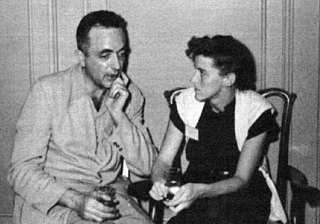
Katherine Anne MacLean was an American science fiction author best known for her short fiction of the 1950s which examined the impact of technological advances on individuals and society.

Laurence van Cott Niven is an American science fiction writer. His 1970 novel Ringworld won the Hugo, Locus, Ditmar, and Nebula awards. With Jerry Pournelle he wrote The Mote in God's Eye (1974) and Lucifer's Hammer (1977). The Science Fiction and Fantasy Writers of America gave him the 2015 Damon Knight Memorial Grand Master Award.

Damon Francis Knight was an American science fiction author, editor, and critic. He is the author of "To Serve Man", a 1950 short story adapted for The Twilight Zone. He was married to fellow writer Kate Wilhelm.

Gene Rodman Wolfe was an American science fiction and fantasy writer. He was noted for his dense, allusive prose as well as the strong influence of his Catholic faith. He was a prolific short story writer and novelist, and won many literary awards. Wolfe has been called "the Melville of science fiction", and was honored as a Grand Master by the Science Fiction and Fantasy Writers of America.
Lester del Rey was an American science fiction author and editor. He was the author of many books in the juvenile Winston Science Fiction series, and the editor at Del Rey Books, the fantasy and science fiction imprint of Ballantine Books, along with his fourth wife Judy-Lynn del Rey.

Joe William Haldeman is an American science fiction author.
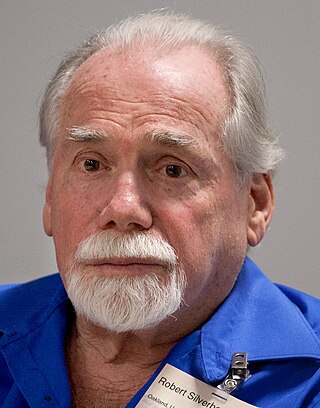
Robert Silverberg is an American author and editor, best known for writing science fiction. He is a multiple winner of both Hugo and Nebula Awards, a member of the Science Fiction and Fantasy Hall of Fame, and a Grand Master of SF. He has attended every Hugo Award ceremony since the inaugural event in 1953.
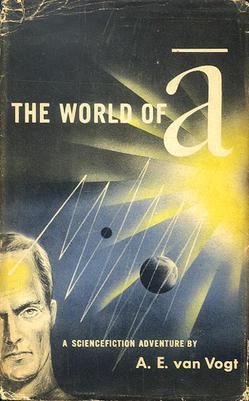
The World of Null-A, sometimes written The World of Ā, is a 1948 science fiction novel by Canadian-American writer A. E. van Vogt. It was originally published as a three-part serial in 1945 in Astounding Stories. It incorporates concepts from the General Semantics of Alfred Korzybski. The name Ā refers to non-Aristotelian logic.
"Common Time" is a science fiction short story by American writer James Blish. It first appeared in the August 1953 issue of Science Fiction Quarterly and has been reprinted several times: in the 1959 short-story collection Galactic Cluster; in The Testament of Andros (1965); in The Penguin Science Fiction Omnibus (1973); and in Isaac Asimov Presents the Great SF Stories.
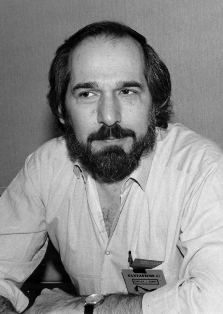
Charles Lewis Grant was an American novelist and short story writer specializing in what he called "dark fantasy" and "quiet horror". He also wrote under the pseudonyms of Geoffrey Marsh, Lionel Fenn, Simon Lake, Felicia Andrews, Deborah Lewis, Timothy Boggs, Mark Rivers, and Steven Charles.
"The Dead Past" is a science fiction short story by American writer Isaac Asimov, first published in the April 1956 issue of Astounding Science Fiction. It was later collected in Earth Is Room Enough (1957) and The Best of Isaac Asimov (1973), and adapted into an episode of the science-fiction television series Out of the Unknown. Its pattern is that of dystopian fiction, but of a subtly nuanced flavor.

Leslie What is a Nebula Award-winning writer of speculative, literary fiction and nonfiction with three books and nearly 100 short stories and essays to her credit. An attendee of Clarion Workshop, she lives in Oregon. She won the Nebula in 1999 for the short story, The Cost of Doing Business, and in 2005, she was a finalist for the Nebula, along with Eileen Gunn, for their co-written novelette, Nirvana High.
"Extempore" is a science fiction short story by American writer Damon Knight. It first appeared in the August 1956 issue of Infinity Science Fiction and has been reprinted twice, in Far Out (1961) and The Best of Damon Knight (1976).

Far Out is a collection of 13 science fiction short stories by American writer Damon Knight. The stories were originally published between 1949 and 1960 in Galaxy Magazine, If Science Fiction and other science fiction magazines. There is an introduction by Anthony Boucher.
"The Last Word" is a science fiction short story by American writer Damon Knight. It first appeared in the February 1957 issue of Satellite Science Fiction and has been reprinted twice, in Far Out (1961) and The Best of Damon Knight (1976).
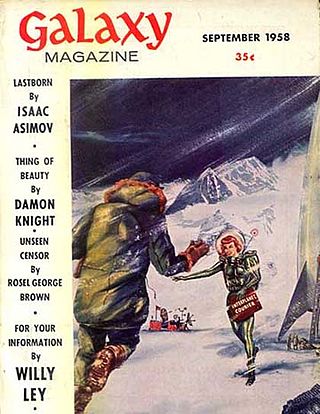
"Thing of Beauty" is a science fiction short story by American writer Damon Knight. It first appeared in the September 1958 issue of Galaxy magazine and has been reprinted three times, in Far Out (1961), The Sixth Galaxy Reader (1962), and The Best of Damon Knight (1976).

In Search of Wonder: Essays on Modern Science Fiction is a collection of critical essays by American writer Damon Knight. Most of the material in the original version of the book was originally published between 1952 and 1955 in various science fiction magazines including Infinity Science Fiction, Original SF Stories, and Future SF. The essays were highly influential, and contributed to Knight's stature as the foremost critic of science fiction of his generation. The book also constitutes an informal record of the "Boom Years" of science fiction from 1950-1955.
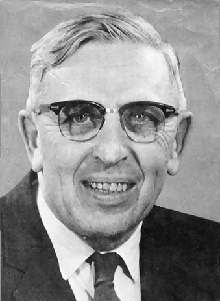
Clifford Donald Simak was an American science fiction writer. He won three Hugo Awards and one Nebula Award. The Science Fiction Writers of America made him its third SFWA Grand Master, and the Horror Writers Association made him one of three inaugural winners of the Bram Stoker Award for Lifetime Achievement. He is associated with the pastoral science fiction subgenre.

The SFWA Grand Masters, Volume 3 is an anthology of science fiction short works edited by Frederik Pohl. It was first published in hardcover by Tor Books in June 2001, and in trade paperback by the same publisher in April 2002. It has been translated into Italian.